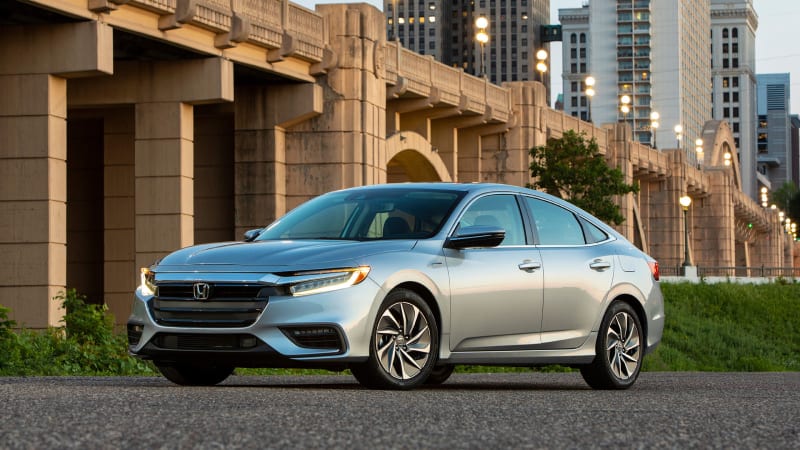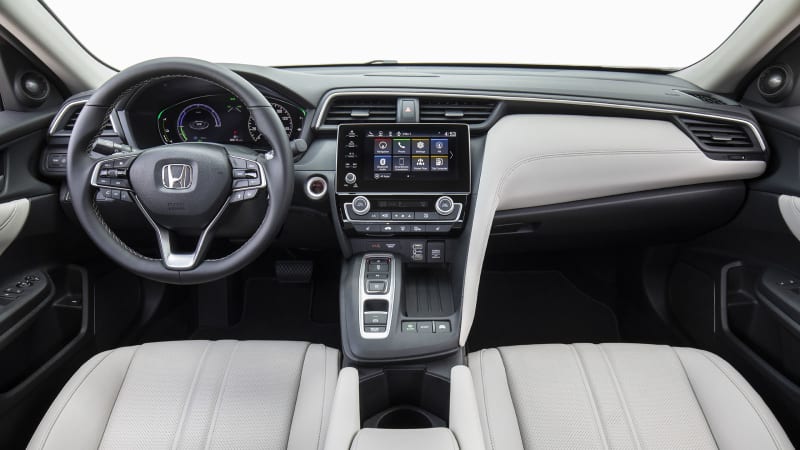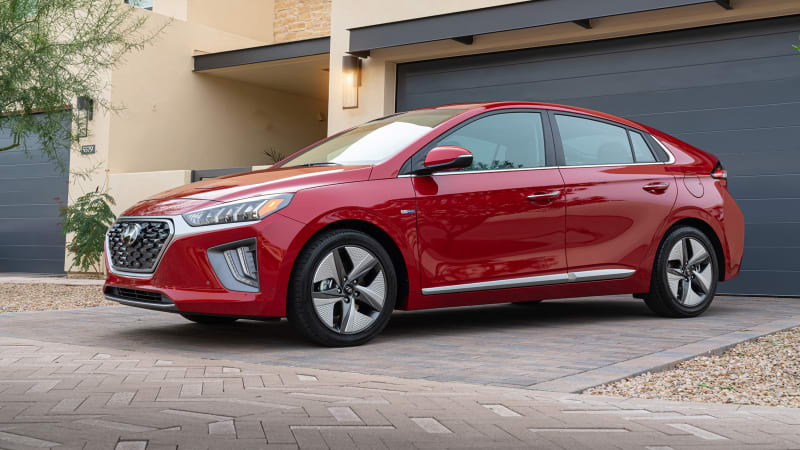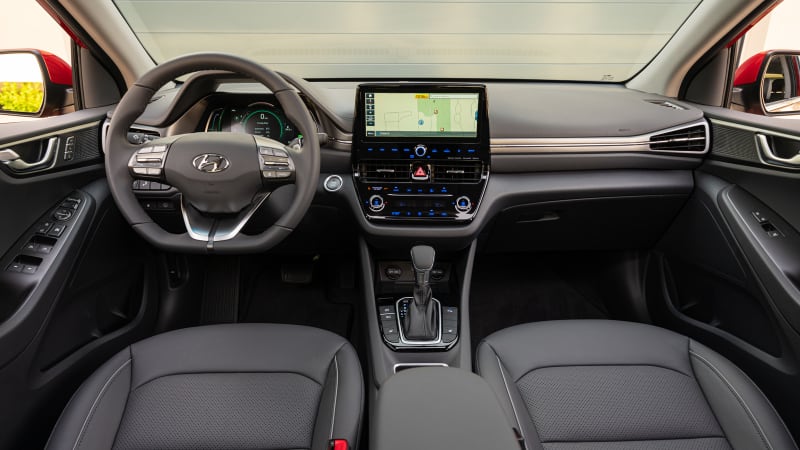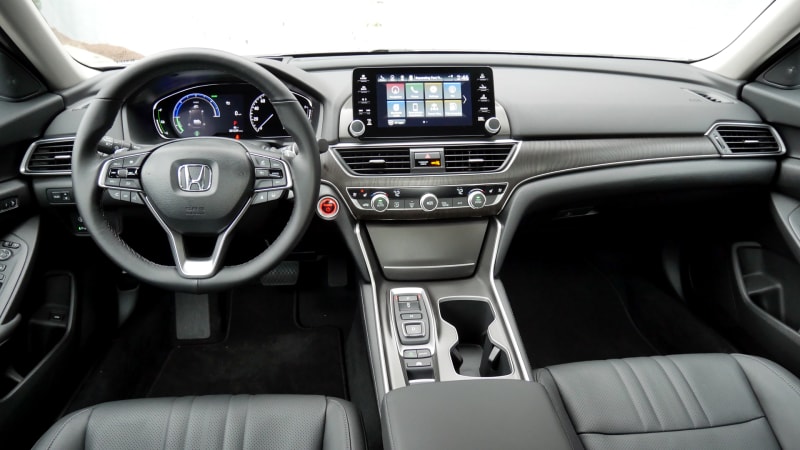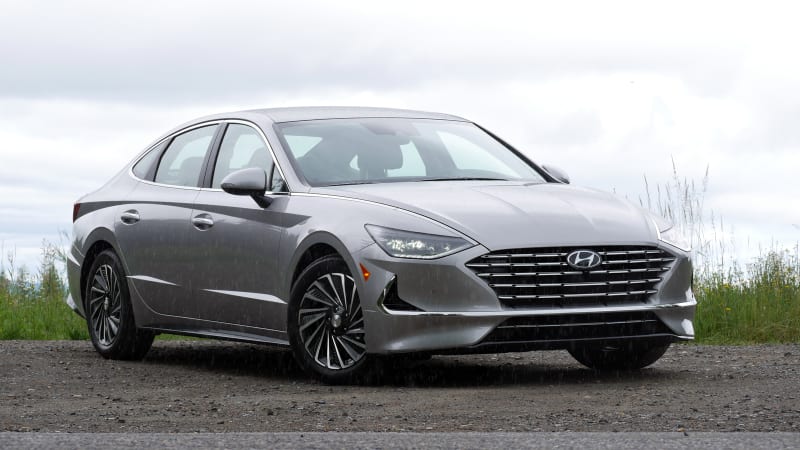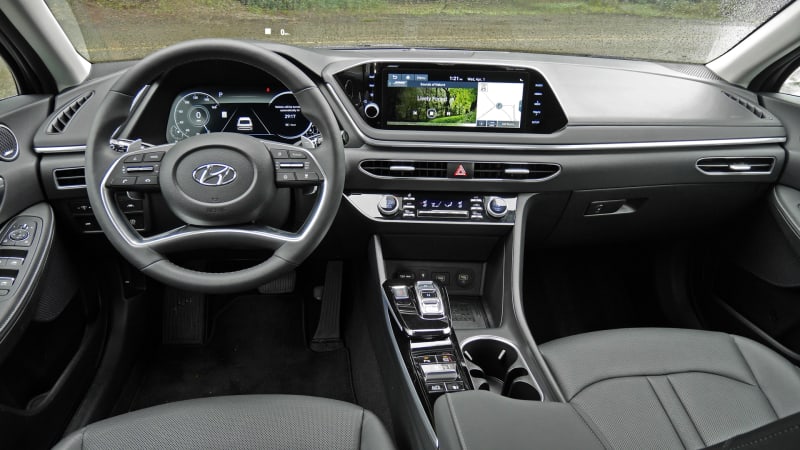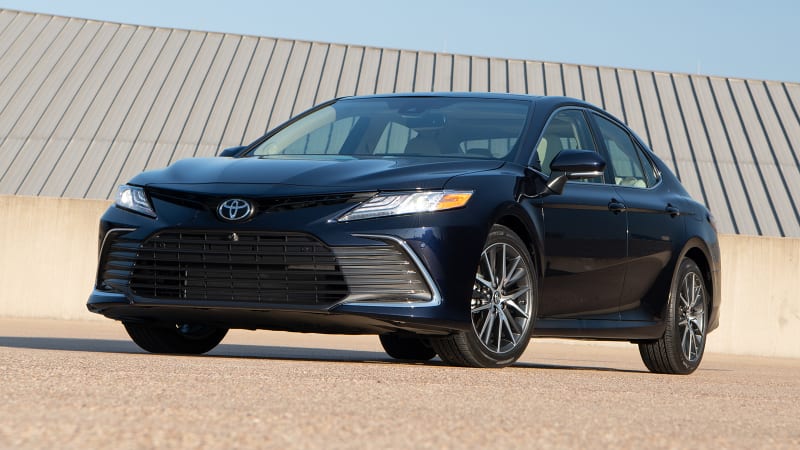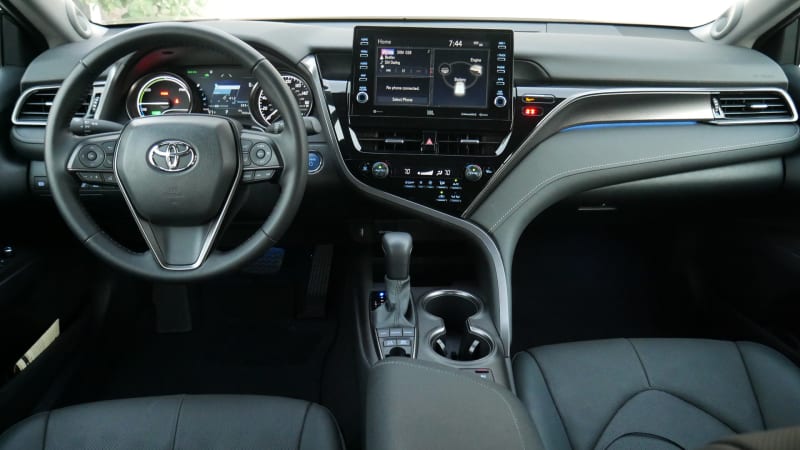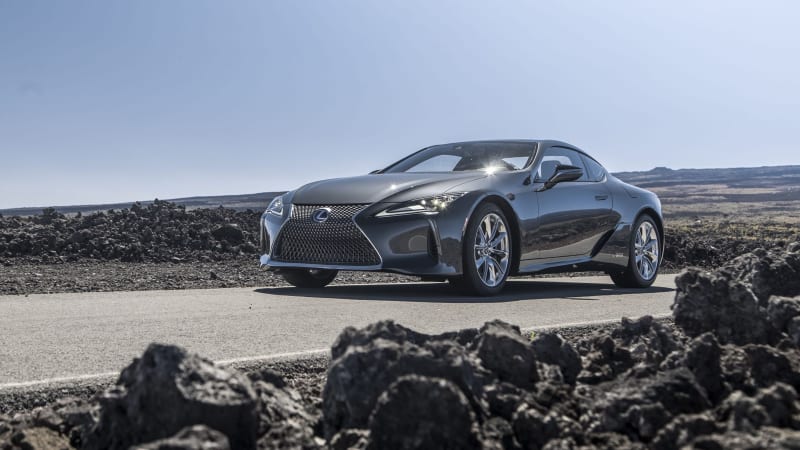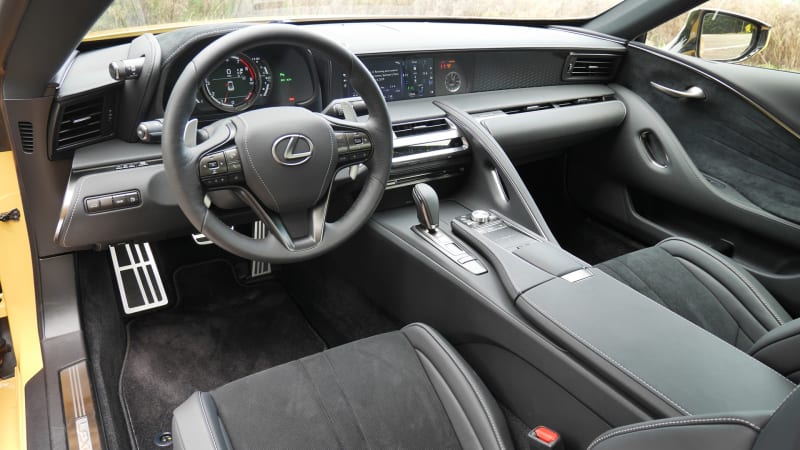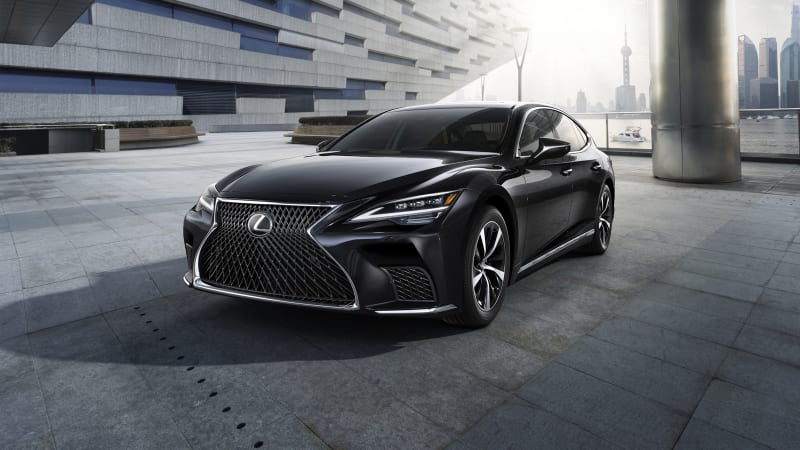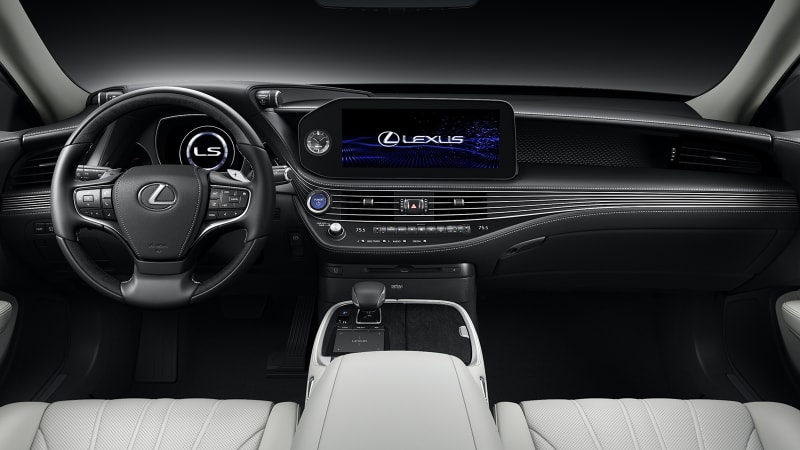With the auto industry pivoting toward complete electrification, it shouldn’t be surprising that the development of new hybrid cars has basically screeched to a halt. Toyota/Lexus makes the bulk of them, while only Honda, Hyundai, Kia and Ford offer them at all. Nevertheless, there are still hybrids out there, and the irony is that they’ve gotten extremely good at roughly the same time people stopped paying attention to them. That’s a shame. We’ve already listed our choices for best hybrid SUVs and did a comparison test between the two hybrid minivans, and here you can see our choices for the best hybrid cars. And nope, the car synonymous with “hybrid,” the Toyota Prius, is not one of them.
Best Small Hybrid Cars | Best Midsize Hybrid Cars | Best Luxury Hybrid Cars
And to be clear, we specifically mean “hybrid” in the traditional gasoline-electric sense where the car recharges its batteries with its engine and by recouping energy from coasting and braking. The gasoline engine and electric motor(s) then pair in some arrangement to power the car together, hence the term “hybrid.” You don’t need to plug it in, and it doesn’t offer an appreciable amount of electric-only range. That’s what differentiates them from plug-in hybrids, which many car brands (most notably those from Europe) are introducing instead these days. They’re also not to be confused with the growing number of “mild hybrids” that may enhance acceleration a tiny bit with an electric motor, but not nearly as much as full hybrids like those listed below can. Their efficiency improvements are also far less.
Yeah, so it’s a bit confusing, but while overlooked, traditional hybrids are still an excellent way of saving gas — be it for economic or environmental reasons. They’re increasingly even the most compelling versions of their respective model lineups, which is definitely something that hasn’t been true in the past.
Best Small Hybrid Cars
Honda Insight
Why it stands out: High-quality cabin; handsome looks; electric-like power delivery
Could be better: Antiquated tech interface
EPA-Estimated Fuel Economy: 52 mpg combined (EX) and 48 mpg combined (Touring)
Read our Honda Insight Review
You’ll be forgiven for not realizing the Insight is a hybrid. Its conventional compact sedan body shape and general lack of weirdness stand in sharp contrast to the hybrid expectations established by the Toyota Prius. Again, you’ll note that car is not found on this list. That’s because the Insight effectively gets the same fuel economy as Toyota’s definitive hybrid, but betters it substantially in terms of interior quality and design, overall comfort and noise, driving response, and quite honestly, it’s not extremely ugly. Quite the opposite, actually. Basically, the Insight is just a better car than the Prius.
Hyundai Ioniq
Why it stands out: Best-in-class fuel economy; best-in-class tech; low price and long warranty; surprisingly fun to drive
Could be better: A bit smaller than its rivals; a bit dorky
EPA-Estimated Fuel Economy: 55 mpg combined or 59 mpg combined (Eco trim level)
Read our Hyundai Ioniq Review
If the Insight is a better car than a Prius, the Ioniq is a much better deal. Though it lacks the polish of the Insight and definitely goes by the Prius design playbook, the Ioniq undercuts the price of both, offers a much better warranty and gets better fuel economy. Most Ioniqs get 55 mpg combined, which is better than every Insight and fall just short of the special Prius Eco model’s 56 mpg combined, while the special Ioniq Blue rules them all at 59 mpg combined. At the same time, the Ioniq is surprisingly fun to drive, and it has the best in-car tech of this trio of compact, dedicated hybrid models. There are also Ioniq Plug-In Hybrid and Ioniq Electric models, which are certainly worth a look as well. Just note that none of the above are to be confused with the upcoming Ioniq 5 electric car.
Best Midsize Hybrid Cars
Honda Accord Hybrid
Why it stands out: Class-leading back seat and trunk space; electric-like power delivery; best-in-class ride and handling
Could be better: Iffy fuel economy of otherwise desirable Sport and Touring trims
EPA-Estimated Fuel Economy: 47 mpg combined or 43 mpg combined (Sport and Touring trim levels)
Read our Honda Accord Hybrid Review
The Honda Accord is our top choice among midsize family sedans, and that doesn’t change when it comes to hybrid versions. In fact, the Hybrid is the Accord version we recommend first as its superior fuel economy and agreeable electric-like power delivery don’t come with substantial tradeoffs. Yes, it’s more expensive than a regular gas-only Accord, but like the other hybrid sedans here, the price premium is manageable given the gas savings. Like every Accord, though, the Hybrid stands out with a truly colossal amount of interior space (the trunk is just enormous), a well-made interior, and a driving experience that sets a just-right balance between ride comfort and handling response. And unlike other Hondas, including the Insight and CR-V Hybrid, the Accord has a newer, more user-friendly tech interface.
Hyundai Sonata Hybrid
Why it stands out: Best-in-class infotainment and safety technology; bold style; drives “more normal”
Could be better: OK, so maybe the styling’s too bold
EPA-Estimated Fuel Economy: 47 mpg combined or 52 mpg combined (Blue trim level)
Read our Hyundai Sonata Hybrid Review
For all the many practical, space-related areas where the Accord Hybrid leads the segment, the Hyundai Sonata Hybrid is basically just a hair or two behind it. At the same time, its bold styling and classy interior help it stand out in non-practical ways — its design may not be for everyone, but Hyundai is always at its best when it’s pushing the envelope, and this latest Sonata is no different. Besides its design, the Sonata Hybrid is a clear standout in terms of infotainment and safety technology. Although the list of features between it and its competitors are similar, Hyundai’s execution and user-friendliness are superior. Many are also likely to prefer driving Hyundai’s hybrid powertrain. It uses a traditional six-speed automatic, meaning it drives “more normal” with stepped gear changes instead of the Camry’s e-CVT or the Accord’s unusual, too-complicated-to-describe-here setup.
Toyota Camry Hybrid
Why it stands out: Different “flavors” of Camry with more luxury- and sport-oriented models
Could be better: Antiquated infotainment system; less refined power delivery
EPA-Estimated Fuel Economy: 46 mpg combined or 52 mpg combined (LE trim level)
Read our Toyota Camry Hybrid Review
The Camry would definitely be our third choice in this group of midsize hybrids, but that’s because the Accord and Sonata do most things just a little better. The Camry Hybrid is still really good. Indeed, it’s the pick of the Camry litter. Its electric motor adds the low-end pull the base four-cylinder lacks, while also smoothing things out considerably. Furthermore, the battery’s placement under the back seat lowers the car’s center of gravity and lessens the front weight bias, making for improved dynamics around corners. A heavy right foot still results in a fair bit of droning from the powertrain, but it is better than past Toyota hybrid efforts, as is the brake-pedal modulation. That you can get it in the sportiest, more luxurious XSE along with a variety of luxury- and sport-oriented “flavors” is icing on the cake. Importantly, it can get the same fuel economy as the Prius while being a wildly more refined and just better car.
Best Luxury Hybrid Cars
Lexus LC 500h
Why it stands out: Just look at the thing; beautiful interior; exceptional fuel economy for a luxury GT
Could be better: Hybrid power delivery can seem a bit weird in a car like this
EPA-Estimated Fuel Economy: 29 mpg combined
Lexus is literally the only luxury car brand that sells conventional hybrids these days, so the fact that it sweeps the podium here should not be taken for anything greater than it is. Its ES 300h hybrid even misses the cut — sure, it’s a hybrid, but it’s hardly a compelling car and the mechanically related Toyota Avalon Hybrid is a better buy.
Now that that’s out of the way, how about the LC 500h! It’s a gorgeous luxury GT with an interior exquisite enough in design and quality to make up for the fact that its tech interface makes you want to pull your hair out. Although the regular LC 500‘s 5.0-liter V8 will always hold a special place in our hearts, there’s no denying that the LC 500h and its 29 mpg combined is a far more responsible choice — especially for a car that’s comfortable and pleasant enough to legitimately drive on a daily basis or on long road trips. The hybrid powertrain is also impressive enough that it won our 2018 Technology of the Year award. This is as close as you can get to a guilt-free luxury GT.
Lexus LS 500h
Why it stands out: Distinctive and exquisitely made interior; more engaging to drive than you’d think; exceptional fuel economy
Could be better: Less powerful than other flagship luxury sedans; less sophisticated infotainment
EPA-Estimated Fuel Economy: 28 mpg combined (RWD) or 26 mpg combined (AWD)
Read our Lexus LS 500h Review
The Lexus LS long ago got a reputation as a dull-as-ditch-water luxury sedan, but that’s just not the case with the latest version. It actually has the same powertrain and shares its rear-wheel-drive platform with the LC 500h, and although it isn’t as sharp as that, this isn’t the Grandpa’s couch that previous LS generations were. We legitimately enjoy driving the LS more than most versions of the BMW 7 Series (imagine saying that 15 years ago!), and that includes the compelling LS 500h hybrid. This does make up for the fact that this hybrid Lexus’ fuel economy isn’t that much better than the gas-only BMW 740i, but that says more about BMW’s engineering wizardry, as no other flagship luxury sedan comes close to either. You’ll also be dealing with Lexus reliability, and although the brand’s design isn’t always for everyone, the LS generally appears more athletic than its more conservative, stately rivals. Its “Signature Spindle Grille” even seems subtle compared to the faces of the flagship BMW, Audi and Genesis sedans.
Source: www.autoblog.com

